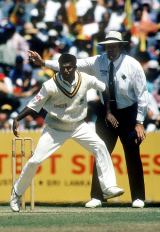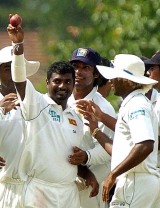Behind enemy lines
The Australian public love to hate Muttiah Muralitharan. Malcolm Knox examines why as the spinner aims to break Warne's Test wickets record in front of them
|
|

|
Among the many unspoken codes of ethics that make international cricket so fascinating, none is more powerful than the omerta of criticism. If you have nothing nice to say about your opponent, keep it on the field or keep it to yourself.
Adam Gilchrist unleashed a firestorm when he broke that omerta in May 2002. It was only a momentary slip, at a "sportsmen's lunch" organised by the Carlton Australian Rules Football Club. Gilchrist was the guest speaker. The president of the club was John Elliott, an Australian businessman and one-time prime ministerial aspirant who was subject to multiple court actions that would rob him of his fortune. In his home city of Melbourne, Elliott was a figure of constant public attention. Gilchrist, though not from Melbourne, recalls: "I should have known better."
As is the norm at these functions, the floor was opened to questions about anything and everything and he was asked about the bowling action of Muttiah Muralitharan. "Technically, if you read the rules, I think he's not quite within them," Gilchrist said, before voicing his concerns about how young subcontinental bowlers were imitating, or improvising, not quite legal actions.
The comments seemed innocuous at the time but a journalist was in the room and the story got out: "Murali is a chucker, says Gilchrist". Cricket Australia, Gilchrist's employer, reprimanded him for "making comments detrimental to the game". Gilchrist, seething at what he saw as a betrayal of privacy by the journalist and disloyalty from Cricket Australia, contacted Murali and apologised. For what? Not for having an opinion, surely, but for getting caught in possession of one. It was acceptable to believe Murali's bent arm was bending the rules but unacceptable to humiliate him publicly. Murali accepted the apology.
The Australian public has never tied itself in such knots. There are many Australians who believe Murali's action is and always has been within the rules. There are many who believe that the ICC's adaptation of the rule to allow a degree of straightening - the "15 degrees of Murali" - is a fair and pragmatic solution that allows a great bowler to stay in the game. But there is also a direct synchrony between the private mutterings in the Australian team dressing room and the noisy chant of the crudest patriots on the Sydney Hill and Melbourne's Bay 13. And that chant goes: "No ball!" They follow Murali around the world. In Barbados, in the 2007 World Cup final, an Australian contingent in the crowd repeatedly chanted "No ball!" when Murali delivered.
Australian umpires have given official expression to this public clamour. In 1995-96 Darrell Hair no-balled Murali in a Test at Melbourne. Ross Emerson and Tony McQuillan, both Australian, did the same in one-day matches. In 1998-99 Emerson no-balled him in a one-day match at the Adelaide Oval, sparking a walk-off led by Arjuna Ranatunga and an extraordinary legal challenge to the jurisdiction of the ICC's match referee. Ranatunga got away with it, beating the rap, but in doing so he embedded the hostility between sections of the Australian public and the Sri Lankan cricketers. (And Emerson never umpired again.)
|
|
Murali, one of the humblest and least confrontational men in cricket, has not relished Australian tours. In fact, on occasion he has declined to tour Australia and stated that he would like never to go there again. But this year he is coming for a two-Test series and in a delicious coincidence he may take the nine wickets he needs to pass Shane Warne's world record of 708.
Where does this antagonism come from? Dr Siri Kannangara, a distinguished rheumatologist who migrated from Sri Lanka to Australia in 1977 and has since maintained a consultative medical role with the Sri Lankan team, says "Australian fear" has led to the point where "instead of how it used to be, anyone but New Zealand or anyone but England, now it's anyone but Sri Lanka".
Yet Kannangara, who with coach Dav Whatmore and physio Alex Kountouris has bridged the divide, with connections in both camps, also points out how much the nations have in common. "When Sri Lanka was applying for membership of the ICC, Australia was its strongest ally. Sri Lankans are grateful for that. When Australia play England, Sri Lankans always barrack for Australia. They see Australians as a fellow sporting nation and a fellow ex-colony."
As in many fraternal relationships, though, the big brother supported the little brother only until he posed a threat. In the 1980s Sri Lanka toured Australia and dutifully took their defeats while celebrating raucously at their rare victories. This changed under the captaincy of Ranatunga in 1995-96. "The Aussies saw Arjuna as a threat," recalls Kannangara, "because he said he could handle these buggers and give them back what they'd been dishing out."
That spiteful tour resulted in open hostilities between the teams, a refusal to shake hands after the Australian one-day series, and Sri Lanka getting the last laugh in the 1996 World Cup final at Lahore. Australian players and supporters alike treated them scornfully, as the upstarts who had gone way too far. Sri Lankans, in turn, loved rubbing it in. I covered Australia's 1996 tour of Sri Lanka, their first match-up after the World Cup, and was surprised not so much by how cocky the Sri Lankan players and supporters were as by how rattled the Australians were.
Many have never understood the Sri Lankans, just as they have never quite understood Murali. In 1995-96, before the Test series, Sri Lanka were playing Queensland in Cairns. Allan Border, in his final season but still as fine a player of spin as ever picked up a bat, could not fathom Murali. Befuddled, he said to his batting partner: "This bloke, he's bowling leggies, right?"
|
|

|
At first Australians called Murali the "rubberband man" but the nicknames soon turned nasty. Coinciding with Ranatunga's raising the on-field temperature and Sri Lanka's new competitiveness was the realisation that Murali was a world-class spin bowler and Warne's only challenger as the greatest of all time.
Since that poisonous summer there has been only one Sri Lankan Test tour of Australia, a two-Test winter one to the north in 2004. It is an insult to a cricketing nation of Sri Lanka's quality, and a burning sore between the countries, that there has been so little Test cricket on Australian soil since 1995-96. "There has been this constant needling," says Kannangara, friend and physician to several current and past Sri Lankan players. "The Sri Lankans have felt they weren't welcome here."
But not all Australians feel this way. Warne polarises Australian supporters far more than Murali ever did and sometimes sympathy with Murali is a way of expressing displeasure with the local boy. Kannangara has noticed there is a generational divide. "Younger Australian fans get jealous and angry about Murali's success," he observes, "but older fans very often don't like Warne at all and they cheer for Murali."
When Murali's action was being examined, it was Australian university biomechanical experts in Sydney, Melbourne and Perth who provided the strongest evidence that his arm was not straightening in delivery.
And for every Australian fan yelling "No ball!" there are another 10 or 20 who are watching silently and even perhaps cheering Murali on. Rarely does a group of cricket fans speak with one voice. In relation to Murali the Australian voices are richly divergent.
Yet so protective of Warne's record are the players and the true believers that it is hard to dispute Kannangara's prediction that, if Murali breaks the world mark, "it won't go down well".
"But remember, Murali may not make it this tour," he adds, almost hopefully. "He's a shy man and he doesn't like being booed. He might not be at his best. He might not take the nine wickets. In two Tests that is still quite a lot, even for Murali."
Malcolm Knox is a former chief cricket correspondent and literary editor of the Sydney Morning Herald and the author of six books
